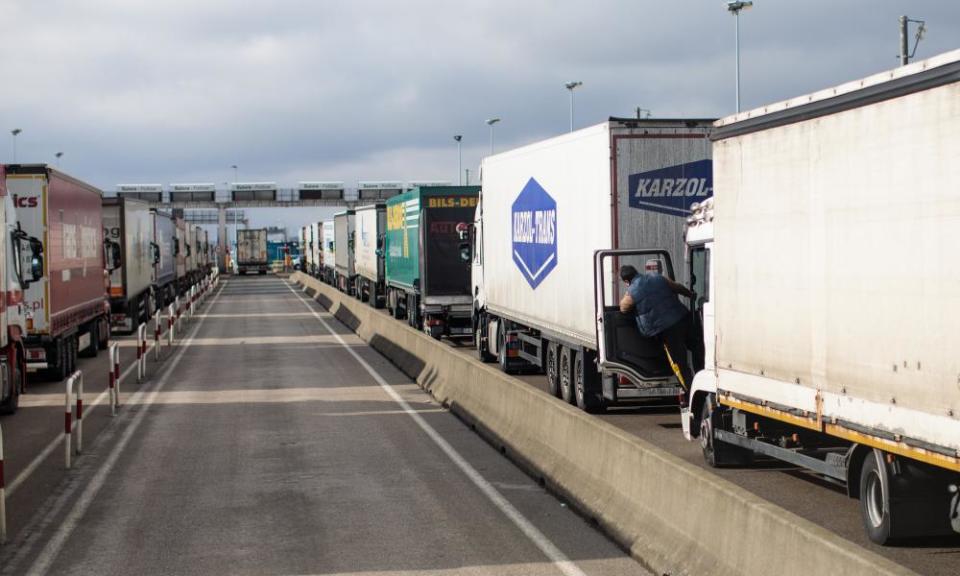EU states escalate no-deal preparations after May defeat

EU governments and businesses are ramping up their preparations to minimise the chaos and disruption of a no-deal Brexit, which many see as significantly more likely after the crushing defeat of Theresa May’s deal in parliament.
With 72 days until the UK is due to leave the EU, France’s Medef business lobby told companies on Wednesday to prepare for a worst-case scenario, saying the vote “had made it quite possible that the UK will leave on 29 March without a deal”.
The Dutch prime minister said that time was running out and urged the British to make up their minds. “A no-deal exit is of course worse than with a deal,” Mark Rutte said. “What the Netherlands is doing is trying to ensure that the damage is minimised.”
Placing the blame firmly on London, Germany’s BDI business lobby said the vote meant that Britain was getting closer to a disorderly Brexit. With UK-German trade worth €175bn a year, the prospect of a no deal “endangers tens of thousands of companies and hundreds of thousands of jobs in Germany and especially in the UK”, it said.
Germany’s carmakers, who sold 800,000 new cars in the UK last year, accounting for 20% of their global exports, were gloomy. “The consequences of a ‘no deal’ would be fatal,” their industry association, VDA, said after the vote, adding: “Jobs in the car industry, particularly on the British side, are on the line.”
BMW, Volkswagen and Mercedes-Benz urged British politicians to create clarity and ensure tariff-free trade can continue. “Uncertainty is not good for business ... We must therefore continue to prepare for the worst-case scenario, which is what a no-deal Brexit would represent,” BMW Group said.[
Belgium’s prime minister, Charles Michel, met cabinet ministers on Tuesday to discuss their top priorities for a package of emergency Brexit laws that he wants to present to parliament before the end of February.
The Belgian government has told businesses and citizens that a no-deal Brexit could lead to the imposition of up to €2.2bn (£1.96bn) in extra tariffs on goods and the loss of more than 40,000 jobs.
The Spanish government this week launched an online information service for citizens and businesses, including advice on how to prepare for a no-deal Brexit. It has also drafted a decree enabling it to enact no-deal contingency provisions drawn up by the European commission.
In a statement released shortly after Tuesday’s vote, the Spanish government said it regretted May’s defeat. It said a no-deal exit would have negative consequences for the EU but would be “catastrophic” for the UK.
The EU’s executive last month unveiled a temporary nine-month plan – which the bloc can terminate unilaterally – to keep planes in the air and goods and money flowing should the UK crash out.

The EU’s executive arm also urged governments to be generous in protecting basic rights for the 1.3 million Britons living in other member states by granting temporary residence permits while they resolved their long-term status.
Several, including the Netherlands, Portugal, Poland and the Czech Republic, have done so, with others, including Austria and Sweden, announcing this week that they planned to rush through similar measures as part of omnibus laws.
No-deal preparations are most advanced in member states that would be the most severely affected, such as Ireland, France, the Netherlands and Belgium. Dublin last month published its no-deal plans, conceding they were at best “a damage-limitation exercise”, and on Tuesday put forward a 17-part omnibus bill to speed through contingency laws on everything from health to tax and justice.
Like most EU countries trading extensively with the UK, Ireland is hiring extra staff – 1,000 in its case – for customs controls, sanitary and phytosanitary checks and export certification. It is also acquiring land near Dublin and Rosslare ports for border inspection bays, truck parks and offices.
Last month, Paris passed no-deal legislation that would keep people and freight moving between France and Britain and allow the government to pass emergency laws by decree if necessary to “stabilise” travel, residence, work and welfare issues for British citizens in France.
French authorities are hiring an extra 700 customs officers, expanding border control infrastructure such as checkpoints, roads and lorry parks, and building warehouses in Calais, Cherbourg and near the entrance to the Channel tunnel.
Germany is hiring an additional 900 customs officials to help ensure the smooth passage of goods, and has passed laws ensuring a limited number of euro financial products, including insurance, will be covered by the EU’s existing passporting regime in the event of no deal.
The Netherlands, home to Europe’s largest port in Rotterdam, aims to have hired more than 900 extra customs officials by the end of the year – one-third of them by the time Britain is scheduled to leave the EU on 29 March – as well as 150 vets and other scientists for checks on food, plant and animal products.
Along with the Belgians, French and Danish, the Dutch have launched comprehensive Brexit impact assessment schemes allowing companies to analyse their specific no-deal risks based on business sector and relationship with the UK.
Sweden has identified a dozen or so sectors where the consequences of a no-deal Brexit could be “immediate and serious”, the country’s EU minister, Ann Linde, said last week.

 Yahoo Finance
Yahoo Finance 